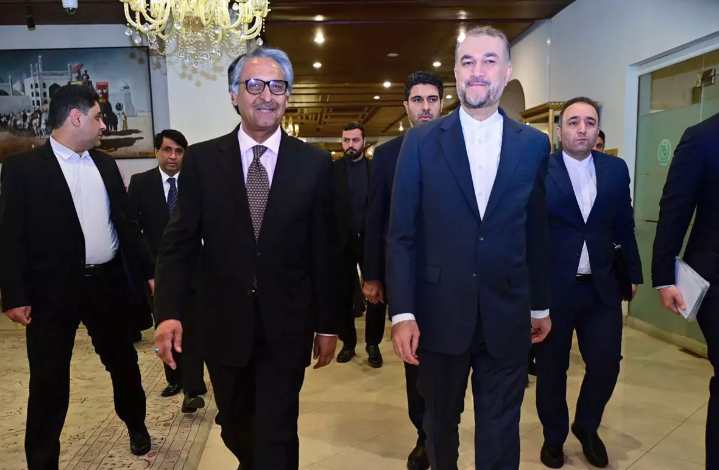Pakistan and Iran agreed Monday to work together to improve security cooperation after at least 11 people were killed this month in deadly airstrikes by Tehran and Islamabad, a significant escalation in fragile relations between the two neighbors.
The announcement came after Iran’s top diplomat, Hossein Amirabdollahian, met in Islamabad with his Pakistani counterpart, Jalil Abbas Jilani. The Iranian foreign minister also met with the caretaker prime minister, Anwaarul-Haq-Kakar.
Relations between the two countries were seriously threatened on Jan. 17 when Iran carried out airstrikes in Pakistan’s volatile southwestern Balochistan province against what Tehran described as hideouts of the anti-Iran militia group Jaish al-Adl, or Army of Justice. Pakistan said two children were killed and three other people were wounded.
Angered by the bombings, Pakistan withdrew its ambassadors from Tehran and carried out airstrikes against suspected militia hideouts in Iran in Sistan and Baluchistan province, killing at least nine people. Islamabad said it was attacking Baloch armed groups with separatist targets.
At a press conference later Monday, Amirabdollahian and Jilani said they would work through existing military, diplomatic and government channels to cooperate.
The two countries were able to bring “the situation back to normal in the shortest possible time” after the airstrikes because both had agreed to resume dialogue to resolve any issues, Jilani said.
“Terrorism poses a common challenge to our countries,” said Jilani, who stressed that “respect for sovereignty and territorial integrity remains the immutable and foundational principle of this cooperation” between neighbors.
She also announced future regular ministerial meetings as well as liaison officers.
Iran and Pakistan “firmly respect each other’s sovereignty and territorial integrity,” Amirabdollahian said. “We will tell all terrorists that we will not (…) give them any opportunity to jeopardize our common security.”
Amirabdollahian noted that the two countries will also establish free trade zones near their borders to bolster bilateral trade.
Iran and Pakistan – a nuclear power – have long regarded each other with suspicion over cross-border militia attacks. Experts said this month’s cross-border attacks were at least partly due to domestic political pressures, although they have also stoked the risk of violence spreading across the Middle East, a region already reeling from Israel’s war against Hamas in Gaza.
During his visit, Amirabdollahian also hopes to brief his hosts on an incident on Saturday in which unknown gunmen shot and killed at least four Pakistani day laborers and wounded three others in Iran’s Sistan and Baluchistan province. Pakistan has condemned the killings, which it called “shocking and despicable.”
Relatives of the deceased Pakistanis demanded Sunday at a march that the bodies of their loved ones be repatriated. Pakistan said this was being worked on with help from Iran, and that the three injured workers were receiving care at an Iranian hospital.

